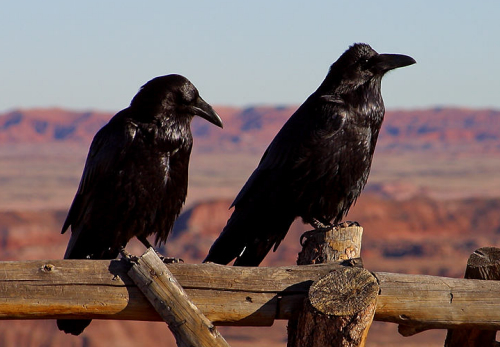Ravens via PDPhoto
Ravens show that consoling one another is also for the birds, Yet another finding that other species have qualities previously thought uniquely human. Our greatest distinction is that we're highly social. Yet in that we've got a lot of company.  
Human brains excel at detecting cheaters. FMRI's, not so much, says Vaughan Bell at Mind Hacks-- though in yet another court case, the fMRI lie detection industry pushes another story.
Bell also has a nice write-up of of scintillating RadioLab program on how early dementia shows up in use of language. A stellar program, and short. You'd be demented not to listen to it.
At n+1, Kent Russell offers Eight Playoff Truisms. He's talking hockey, but most of it would go for basketball. I care zero for hockey but found this a fun read.
Backreaction: The Future of the Conference wonders whether we'll quit all this traveling and just conference in cyberspace. I don't see it. No substitute for meatspace, which we manage and mine far more skillfully than anyone does the web. Don't get me wrong, I love the web. But it can't replace meatspace any more than meatscape can it.
You can now order Here Is a Human Being: At the Dawn of Personal Genomics, by Misha Angrist, a writer who talked his way into being one of the first ten people to have his entire genome sequenced. Haven't read it myself yet, but after meeting Misha and hearing him talk -- and spar with Jim Watson (Angrist is not just a cheerleader for all things genomic) -- I believe this will be a good read.
Â


Thanks for including this information and link to "The Future of the Conference". Virtual worlds are an interesting invention, and perhaps the future of the internet itself. I maybe be one of the first however to raise the issue of the implications virtuality has on the mind and brain. Currently, virtual experiences are a fantasy like visual, with some communication potentials, voice or text, Is there a measurable difference to the brain if the virtual world resembles a real life (RL) experience? I believe there mat be, differences in both in the quality of the experience and the memory of it.
I think a theory to pursuit here that could shape the direction of virtual worlds.
I think a theory to pursuit here that could shape the direction of virtual worlds. I agree Ted.Thanks.